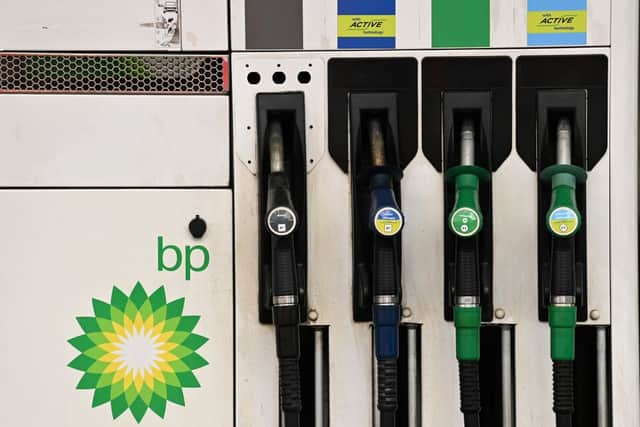Why is diesel more expensive than petrol? Record price gap between fuels explained and when costs could fall
and live on Freeview channel 276
The difference in price between diesel and petrol has soared to new levels, leaving drivers facing growing inequality at the pumps.
As fuel prices edge up around the country, diesel costs have jumped more quickly in recent weeks, leading to a record-breaking 24p per litre difference between the two fuels. An average litre of diesel is now 189.27p while petrol is 165.75p per litre, according to the latest figures from the RAC Fuel Watch service.
Advertisement
Hide AdAdvertisement
Hide AdThe difference between the two fuels reached a record of 17p per litre at the start of October but the gap has continued to stretch since then, leaving diesel drivers questioning why they are paying so much more than those with petrol vehicles. Before 2022, the gap between the two fuels never reached more than 11p and historically has averaged around 4p per litre. In May 2021 it dropped to as low as 2p per litre.
After dropping consistently between early July and early October, the cost of petrol and diesel has begun to climb in recent weeks but at different rates. While petrol has crept up by around 3p since 3 October, diesel has jumped by more than 9p per litre in the same period.


RAC fuel spokesman Simon Williams said: “The gap between the average price of petrol and diesel has now grown to a new record at almost 24p a litre (23.75p). But there is a glimmer of hope that pump prices may have peaked.”
Why is diesel more expensive than petrol?
The cost of diesel can be broken down into the same basic elements as petrol - production cost and taxation.
Advertisement
Hide AdAdvertisement
Hide AdBoth petrol and diesel are subject to the same 52.95p per litre fuel duty and VAT is applied at 20% on both as well, so the extra cost comes down to the production and supply costs.
Historically, UK refineries have struggled to meet demand for diesel and the country has had to import the fuel from abroad, with up to half of the country’s supplies coming from overseas. That increases its production and transportation costs relative to petrol, which retailers then pass on to customers.
Diesel is also used as a heating fuel in some countries, meaning there is greater competition for supplies, leading to higher wholesale prices.
According to Fuel Watch, the wholesale price of diesel is currently just over 80p per litre, 20p per litre more than for petrol. In early October the difference was 12p per litre. On top of that, delivery and oil company costs are around 0.4p per litre more for diesel and biofuel additives cost 7p per litre more for diesel than petrol - a difference that has also grown since the start of October.
Advertisement
Hide AdAdvertisement
Hide AdThe situation is also being made worse by to the war in Ukraine. The UK imports around half its diesel needs and previously a large proportion of this came from Russia. According to Autocar, the Netherlands is the UK’s second largest supplier of diesel but it also buys a large proportion of its crude oil from Russia.
Mr Williams commented: “Several factors are combining to make diesel more expensive. While the EU is not set to ban Russian diesel imports until February 2023, the UK has already done so. This is significant as we used to import a third of our diesel from Russia.
“In addition, European demand for gas oil – red diesel – tends to go up at this time of year as it is commonly used for heating. And this is greater this autumn as Europe is looking to lessen its reliance on gas and, as a result, is boosting its diesel supplies to get through the winter.”
There have also been suggestions in the past that retailers are happy to charge more for diesel in order to keep the price of petrol down. The belief is that private car owners, most of whom drive petrol cars are more likely to shop around for the best deal than business users who top up with diesel.
Will diesel prices come down?
Advertisement
Hide AdAdvertisement
Hide AdDiesel prices reached record highs in early July, when an average litre reached 199p. Since then they have fallen, dropping back to around 180p per litre at the start of October, but the decline has been slower than petrol. Between 1 September and 1 October, the average cost of a litre of diesel fell by 3.5p while petrol fell by 7p.
Although prices have begun to creep up again since early October, Mr Williams says we are unlikely to see a return to the highs of July.
He said: “Looking at the cost of wholesale diesel there is a glimmer of hope that pump prices may have peaked for the time being. This will hopefully prevent the average price seen across UK forecourts going too far above 190p. It should also mean that the record average price of 199p a litre isn’t imminently in danger of being surpassed.”
Comment Guidelines
National World encourages reader discussion on our stories. User feedback, insights and back-and-forth exchanges add a rich layer of context to reporting. Please review our Community Guidelines before commenting.
